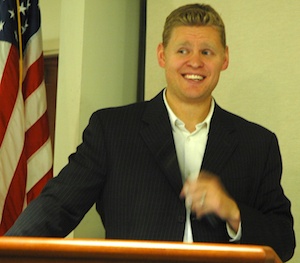SMOKEY POINT — Snohomish County Councilman Ken Klein reflected on 2014 as “a year of tragedy,” even as he looked forward to tackling 2016 with a spirit of post-partisanship and a pragmatic approach toward issues such as homelessness.
During his Nov. 10 address to the Arlington-Smokey Point Chamber of Commerce, Klein praised Arlington and Marysville for coming together after last year’s Oso slide and Marysville-Pilchuck High School shooting, and deemed their conduct a useful model for the nation to follow.
“Rather than federal and state people kicking the local folks out, we’ve used local resources who are closest to the problems and know how to handle them,” said Klein, who nonetheless has welcomed input from others on how to deal with the homeless.
As the council’s only Republican, Klein not only touted his work with his Democratic colleagues to rescind pay raises that former county executive John Lovick approved for certain managers, but also reported that incoming county executive Dave Somers supported Klein’s proposal to “define the problem” of homelessness, through a board with representatives of government, non-profit and for-profit agencies.
Klein has even advocated that Snohomish County follow King County’s example by making all its county offices non-partisan. The Snohomish County executive, council members and prosecutor are all partisan.
“Instead of people protecting their party labels, we could have them be accountable for their performance,” Klein said, adding that this would decrease the number of midterm resignations. “Right now, you have a handful of activists on each side who select the nominees and successors. They’re picked through partisan games rather than skill.”
Klein estimated that he and his fellow council members manage to find common ground 90 percent of the time, but noted that he differs slightly regarding the proposed county courthouse. He agreed that a new, relocated courthouse would cost too much, but he favors remodeling and eventually expanding the existing one.
“It would be fiscally irresponsible to just throw away everything that’s been done,” Klein said. “If we were to stop these construction bonds, when we got them at some of the lowest levels in history, and then went back to remodel the courthouse later, we’d be selling low and buying high. We need a good-faith effort to review what a remodel would actually cost.”
Klein defended housing the homeless on the grounds of fiscal conservatism as well, by presenting the alternative of cycling the homeless through jail as costly and unproductive.
“In Utah, they’re focusing on housing first,” Klein said, “We’re all already paying for the homeless anyway. We just need to do it more smartly.”
Klein has reached out to officials from Seattle, Portland and even Los Angeles to see how they’ve handled the problem, but he’s also calling for federal bureaucracy to be less intrusive and self-contradictory in its regulations of how local jurisdictions can address the issue.
“Should we make zoning cheaper to allow for more homeless shelters?” Klein asked. “Resources are available, but the system is not set up for us to succeed in using them. Again, this needs to be under local control, because we understand what’s going on here better than the feds.”
Klein pointed out that social workers are embedded with Everett police to prevent homeless people with mental health issues from being put in jails that “aren’t set up to handle their problems.”
At the same time, Klein believes an increase in beds at Snohomish County jails can aid other jurisdictions in housing their inmates.
Returning to the homeless problem, Klein asserted that identifying the root causes of homelessness is the biggest step.
“You’ll get a different answer to that question from every agency that you talk to,” Klein said. “We need to get them all in the same room, with all the research.”
He added: “What we do know is who the most frequent utilizers of our services for the homeless are. One person in Utah was using half a million dollars in services every year. When he got permanent housing and a casework, that yielded an enormous cost savings.”
Klein believes the best thing the council can do for citizens is to be transparent in their dealings.
“It’s when people see things happening as a result of backroom deals that they lose trust in government,” Klein said. “It’s okay to have honest disagreements as long as the conversations are out in the open. I enjoy working with people that I occasionally disagree with.”







